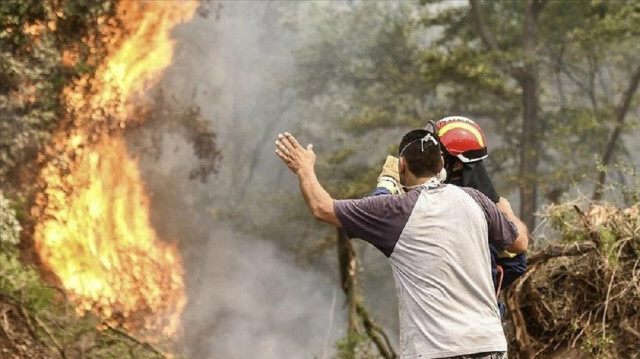
Large blaze in Attica region burns for 3rd day along with others in several different areas, turning thousands of hectares to ash
Amid major wildfires across the country, Greek authorities on Thursday ordered the evacuation of several cities.
Blazes burning for a third day in the Attica region, where the capital Athens is located, have destroyed thousands of hectares of rich forestland and damaged houses, darkening the sky with smoke and ash.
The fire that erupted near Varibobi, a suburb of Athens, on Tuesday reignited, spreading to the east towards Mt. Parnitha on Thursday evening.
Several cities around the area – Kryoneri, Kokkinovrachos and Afidnes – received evacuation orders, while Ippokratios Politia and Drossopigi were already evacuated.
According to reports, the flames have crossed a national highway towards other areas amid fears that the they would spread even further towards the north and east, reaching the towns of Kapandriti and Aghios Stefanos.
Dramatic scenes unfolded in several areas as firefighters endeavored to evacuate homes while residents struggled to save their property.
Currently, only vehicles and on-foot teams are in the area battling with the fire, which appear to be out of control.
Airborne efforts will resume at dawn, while two Swedish aircraft arriving through the RescEU emergency assistance program have been grounded in Poland due to the weather.
Other parts of Greece also continue to grapple with wildfires.
Dozens of villages and towns have been evacuated on Evia Island and in the Peloponnese.
On Evia Island, several villages were evacuated since Tuesday, while more were evacuated on Thursday by boat.
Firefighters in the southern Peloponnese region said a blaze that ignited in forest areas in the northwestern Olympia region on Wednesday continued through the night, while extraordinary efforts were made to protect a nearby ancient city and museum which were under threat.
The country's civil protection agency has warned that fires across southern Greece will increase on Friday due to expected strong winds. This is despite a slight decrease in temperatures that have reached up to 45 C (113 F), making it one of the worse heat waves the country has faced since 1987.
"The government's priority is to protect human lives first, then to protect private property, the natural environment, and critical infrastructure," Greek Prime Minister Kyriakos Mitsotakis said earlier in a live address.
"Unfortunately, the simultaneous achievement of all these targets is simply untenable."
Hello, the comments you share on our site are a valuable resource for other users. Please respect other users and different opinions. Do not use rude, offensive, derogatory, or discriminatory language.
The floor is all yours.








